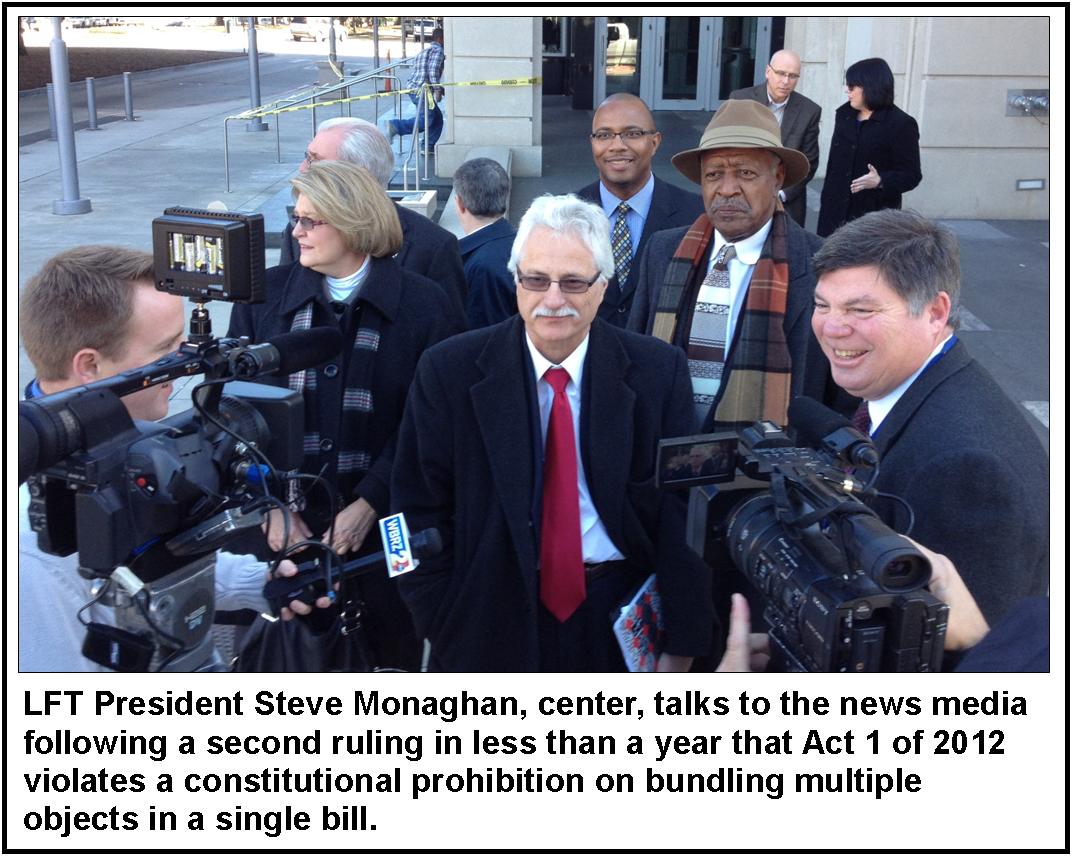(Baton Rouge – January 8, 2014) For the second time in less than a year, a Baton Rouge district court judge has ruled Act 1 of 2012, the so-called “talent act,” unconstitutional.
Judge Michael Caldwell first ruled the act unconstitutional last March, agreeing with a lawsuit brought by the Louisiana Federation of Teachers. The judge said Act 1 violated a ban on bundling multiple objects into one piece of legislation. But the State Supreme Court remanded the case to the 19th Judicial District, asking Judge Caldwell to reconsider his ruling in light of another decision.
In a carefully worded ruling that acknowledged the Supreme Court’s reservations, Judge Caldwell said that while the high court’s decision had broadened the definition of a bill’s objects, “The object (of the bill) is not apparent to me in several provisions of the act.”
Therefore, Judge Caldwell said, Act 1 violates the multiple object clause and is “unconstitutional in its entirety.”
“The judge basically affirmed what we said from the very beginning,” LFT President Steve Monaghan said after the verdict. “Facts are facts. This was a sprawling piece of legislation that was duck taped together. It was hastily done and we took it to court as we promised to do. As we said from day one, we came to court out of respect for the constitution.”
The act was one of the bills that Gov. Bobby Jindal touted as his education reform agenda in 2012. It amended and reenacted nine statutes and enacted two entirely new statutes. It tied teacher salaries, tenure, promotions and termination to a new evaluation system. It changed the way school boards contract with superintendents, altered the general powers of school boards, delegated new authority to principals and superintendents and mandated different reduction-in-force policies.
An attorney for the state told reporters that Judge Caldwell’s decision will be appealed directly to the Supreme Court.
The law will remain in effect until the high court makes a final decision. Sections of the act dealing with teacher evaluations, tenure, promotions and salaries are unfair and unworkable, the LFT president said.
“No matter how this case is ultimately decided, the legislature will have to revisit the whole concept of education reform,” Monaghan said. “We hope they will not try to pass the repugnant sections of this act as individual pieces of legislation.”
At a press conference following the verdict, Jindal said that he is willing to work with anyone to provide excellent teachers for Louisiana’s classrooms.
“That is our goal as well,” Monaghan said. “We are ready to talk to the governor at any time about reforms that will truly improve education and create a better future for the children of Louisiana.”
Another of the governor’s education bills, Act 2 of 2012, has been declared unconstitutional by the Supreme Court because it unlawfully diverted public education funds to private, religious and corporate education providers.
– Louisiana Federation of Teachers

